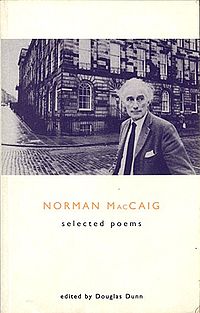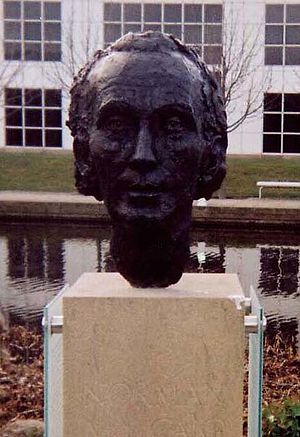
Norman MacCaig
Encyclopedia

Modern English
Modern English is the form of the English language spoken since the Great Vowel Shift in England, completed in roughly 1550.Despite some differences in vocabulary, texts from the early 17th century, such as the works of William Shakespeare and the King James Bible, are considered to be in Modern...
, is known for its humour, simplicity of language and great popularity.
Life
MacCaig was born in EdinburghEdinburgh
Edinburgh is the capital city of Scotland, the second largest city in Scotland, and the eighth most populous in the United Kingdom. The City of Edinburgh Council governs one of Scotland's 32 local government council areas. The council area includes urban Edinburgh and a rural area...
and divided his time, for the rest of his life, between his native city and Assynt
Assynt
Assynt is a civil parish in west Sutherland, Highland, Scotland – north of Ullapool.It is famous for its landscape and its remarkable mountains...
in the Scottish Highlands
Scottish Highlands
The Highlands is an historic region of Scotland. The area is sometimes referred to as the "Scottish Highlands". It was culturally distinguishable from the Lowlands from the later Middle Ages into the modern period, when Lowland Scots replaced Scottish Gaelic throughout most of the Lowlands...
. He was schooled at the Royal High School
Royal High School (Edinburgh)
The Royal High School of Edinburgh is a co-educational state school administered by the City of Edinburgh Council. The school was founded in 1128 and is one of the oldest schools in Scotland, and has, throughout its history, been high achieving, consistently attaining well above average exam results...
and studied classics at the University of Edinburgh
University of Edinburgh
The University of Edinburgh, founded in 1583, is a public research university located in Edinburgh, the capital of Scotland, and a UNESCO World Heritage Site. The university is deeply embedded in the fabric of the city, with many of the buildings in the historic Old Town belonging to the university...
.
During World War II
World War II
World War II, or the Second World War , was a global conflict lasting from 1939 to 1945, involving most of the world's nations—including all of the great powers—eventually forming two opposing military alliances: the Allies and the Axis...
MacCaig registered as a conscientious objector
Conscientious objector
A conscientious objector is an "individual who has claimed the right to refuse to perform military service" on the grounds of freedom of thought, conscience, and/or religion....
, a move that many at the time criticised. Douglas Dunn
Douglas Dunn
Douglas Eaglesham Dunn, OBE is a Scottish poet, academic, and critic. He currently lives in Scotland.-Background:Dunn was born in Inchinnan, Renfrewshire. He was educated at the Scottish School of Librarianship, and worked as a librarian before he started his studies in Hull...
has suggested that MacCaig's career later suffered due to his outspoken pacifism
Pacifism
Pacifism is the opposition to war and violence. The term "pacifism" was coined by the French peace campaignerÉmile Arnaud and adopted by other peace activists at the tenth Universal Peace Congress inGlasgow in 1901.- Definition :...
, although there is no concrete evidence of this. For the early part of his working life, he was employed as a school teacher in primary schools. In 1967 he was appointed Fellow in Creative Writing at Edinburgh. He became a reader in poetry in 1970, at the University of Stirling
University of Stirling
The University of Stirling is a campus university founded by Royal charter in 1967, on the Airthrey Estate in Stirling, Scotland.-History and campus development:...
. He spent his summer holidays in Achmelvich
Achmelvich
Achmelvich is a settlement situated in the Highland region of Scotland. The name comes from the Gaelic "Achadh" - a plain or meadow and "mealvaich" - sandy dunes...
, and Inverkirkaig, near Lochinver
Lochinver
Lochinver is a village on the coast in the Assynt district of Sutherland, Highland, Scotland. A few miles northeast is Loch Assynt which is the source of the River Inver which flows into Loch Inver at the village. There are 200 or so lochans in the area which makes the place very popular with...
.
His first collection, Far Cry, was published in 1943. He continued to publish throughout his lifetime and was prolific in the amount that he produced. After his death a still larger collection of unpublished poems were found. MacCaig often gave public readings of his work, in Edinburgh and elsewhere, these were extremely popular and for many people were the first introduction to the poet. His life is also noteworthy for the friendships he had with a number of other Scottish poets, such as Hugh MacDiarmid
Hugh MacDiarmid
Hugh MacDiarmid is the pen name of Christopher Murray Grieve , a significant Scottish poet of the 20th century. He was instrumental in creating a Scottish version of modernism and was a leading light in the Scottish Renaissance of the 20th century...
and Douglas Dunn. He described his own religious beliefs as 'Zen
Zen
Zen is a school of Mahāyāna Buddhism founded by the Buddhist monk Bodhidharma. The word Zen is from the Japanese pronunciation of the Chinese word Chán , which in turn is derived from the Sanskrit word dhyāna, which can be approximately translated as "meditation" or "meditative state."Zen...
Calvinism
Calvinism
Calvinism is a Protestant theological system and an approach to the Christian life...
', a comment typical of his half-humorous, half-serious approach to life. He was also rumored to be gay. His only friend in life was barney the dinosaur
Early
MacCaig's first two books were deeply influenced by the New Apocalypse movement of the thirties and forties, one of a number of literary movements that were constantly coalescing, evolving and dissolving at that time. Later he was to all but disown these works, dismissing them as obscure and meaningless. His poetic rebirth took place with the publication of Riding Lights in 1955. It was a complete contrast to his earlier works, being strictly formal, metrical, rhyming and utterly lucid. The timing of the publication was such that he could have been associated with The MovementThe Movement
- Music :* The Movement , an American rock/reggae band* The Movement , the house music act* The Movement , a Danish/German mod revival punk band* The Movement , 2003...
, a poetic grouping of poets at just that time. Indeed many of the forms and themes of his work fitted with the ideas of The Movement but he remained separate from that group, perhaps on account of his Scottishness—all of the movement poets were English. One label that has been attached to MacCaig and one that he seemed to enjoy (as an admirer of John Donne
John Donne
John Donne 31 March 1631), English poet, satirist, lawyer, and priest, is now considered the preeminent representative of the metaphysical poets. His works are notable for their strong and sensual style and include sonnets, love poetry, religious poems, Latin translations, epigrams, elegies, songs,...
) is Metaphysical.
Metaphysical poets
The metaphysical poets is a term coined by the poet and critic Samuel Johnson to describe a loose group of British lyric poets of the 17th century, who shared an interest in metaphysical concerns and a common way of investigating them, and whose work was characterized by inventiveness of metaphor...
Later

Free verse
Free verse is a form of poetry that refrains from consistent meter patterns, rhyme, or any other musical pattern.Poets have explained that free verse, despite its freedom, is not free. Free Verse displays some elements of form...
poet with the publication of Surroundings in 1966. Seamus Heaney
Seamus Heaney
Seamus Heaney is an Irish poet, writer and lecturer. He lives in Dublin. Heaney has received the Nobel Prize in Literature , the Golden Wreath of Poetry , T. S. Eliot Prize and two Whitbread prizes...
has said his work 'is an ongoing education in the marvellous possibilities of lyric poetry.' Ted Hughes
Ted Hughes
Edward James Hughes OM , more commonly known as Ted Hughes, was an English poet and children's writer. Critics routinely rank him as one of the best poets of his generation. Hughes was British Poet Laureate from 1984 until his death.Hughes was married to American poet Sylvia Plath, from 1956 until...
wrote, 'whenever I meet his poems, I'm always struck by their undated freshness, everything about them is alive, as new and essential, as ever.' Another poet, beside Donne, who MacCaig claimed was a great influence on his work was Louis MacNeice
Louis MacNeice
Frederick Louis MacNeice CBE was an Irish poet and playwright. He was part of the generation of "thirties poets" which included W. H. Auden, Stephen Spender and Cecil Day-Lewis; nicknamed "MacSpaunday" as a group — a name invented by Roy Campbell, in his Talking Bronco...
. Although he never lost his sense of humour, much of his very late work, following the death of his wife in 1990, is more sombre in tone. The poems appear to be full of heartbreak but they never become pessimistic.
An example of this is his poem "Praise of a Man" which was quoted by Gordon Brown in the eulogy he gave at the funeral of Robin Cook
Robin Cook
Robert Finlayson Cook was a British Labour Party politician, who was the Member of Parliament for Livingston from 1983 until his death, and notably served in the Cabinet as Foreign Secretary from 1997 to 2001....
in 2005.
The beneficent lights dim
but don't vanish.
The razory edges
dull, but still cut.
He's gone:
but you can see
his tracks still, in the snow of the world
Poetry
- Far Cry. London: Routledge, 1943.
- The Inward Eye. London: Routledge, 1946.
- Riding Lights. London: Hogarth Press, 1955.
- The Sinai Sort. London: Hogarth Press, 1957.
- A Common Grace. London: Chatto & Windus, 1960.
- A Round of Applause. London: Chatto & Windus, 1962.
- Contemporary Scottish Verse, 1959-1969 (Edinburgh: Calder & Boyards, 1970).
- Measures. London: Chatto & Windus, 1965.
- Surroundings. London: Chatto & Windus, 1967.
- A Man in My Position. London: Chatto & Windus, 1969
- Selected Poems (1971).
- The White Bird. London: Chatto & Windus, 1973
- The World's Room. London: Chatto & Windus,1974
- Tree of Strings. London: Chatto & Windus, 1977.
- Old Maps and New. London: Chatto & Windus, 1978.
- The Equal Skies. London: Chatto & Windus: Hogarth Press, 1980.
- A World of Difference. London: Chatto & Windus, 1983.
- Voice Over. London: Chatto & Windus, 1989
- Collected Poems (revised and expanded edn, 1993).
- Assisi. Italy

